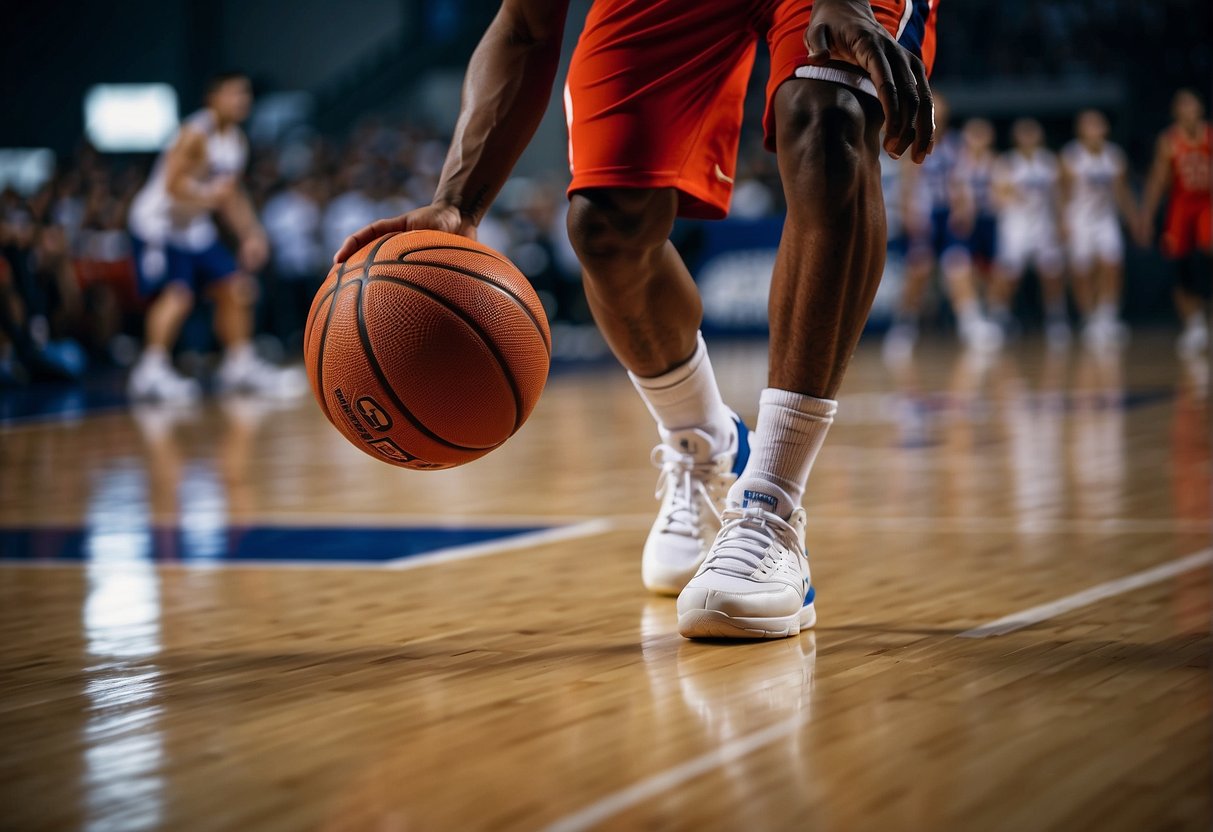Explore performance enhancement in the NBA with my expert insights: do NBA players take creatine? Delve into the use of supplements and their potential effects on player performance.
What Is Creatine?
Creatine is a naturally occurring molecule in your body synthesizing energy for muscle contractions. It’s found in foods like meat and fish but can also be taken as a dietary supplement. This compound is pivotal for the quick energy system, particularly the production of ATP (adenosine triphosphate), which fuels short bursts of power and effort.
Role of Creatine in High-Intensity Exercise
During high-intensity activities, your muscles rely on ATP for immediate energy. However, ATP stores are limited. That’s where creatine comes in. By increasing the phosphocreatine reserves in your muscles, creatine supplementation can help you regenerate ATP more quickly, leading to improved performance and endurance in sports requiring rapid, explosive movements.
Creatine’s Impact on Muscle and Strength Gains
Supplementing with creatine can lead to muscle mass gains, as it draws water into your muscle cells and helps initiate processes that lead to new muscle growth. Over time, this muscle strength enhancement and resistance training can translate to tangible gains in athletic performance, including basketball,, where quick movements and explosive power are crucial.
Do NBA Players Take Creatine? Usage and Benefits

Prevalence of Creatine Use Among NBA Players
It’s no secret that NBA players always look for ways to improve their game. Creatine use is prevalent among athletes to enhance their power output and overall performance on the court. Research has shown that supplementing with creatine can improve shooting precision and reduce fatigue, making it a popular choice in sports nutrition.
Advantages of Creatine for Basketball Players
For you as a basketball player, creatine could be that extra edge you’re looking for. It helps in several key areas:
- Muscle Mass: Increasing muscle mass for more power during play.
- Energy Production: Boosting energy production for sustained high-intensity exercise.
- Recovery: Facilitating faster recovery post-training or game.
Notable NBA Figures and Their Supplement Choices
When examining NBA figures and their diets, it’s interesting to note how some of the greatest players like LeBron James manage their nutrition. While specific supplement choices may vary, the consensus around the benefits of creatine supplements in supporting an NBA player’s diet and performance has been significant.
Players past and present, from LeBron to MJ (Michael Jordan), have been meticulous about what they consume, underscoring the importance of diet in maintaining their elite status in the sport.
Scientific Insights on Creatine Supplementation

Discover the research-backed benefits and safety protocols of creatine, a popular supplement in the sports world. Find out what the experts say and whether it could be the fitting addition to your training regimen.
Research on Performance Enhancement
Creatine monohydrate has been extensively studied as a dietary supplement for its potential to enhance athletic performance. Research indicates that creatine can improve high-intensity exercise capacity and contribute to muscle mass growth due to its role in energy production within muscles. Studies focusing on basketball players have noted improvements such as increased shooting precision and reduced fatigue.
Safety and Efficacy of Long-Term Use
Regarding long-term use, the International Society of Sports Nutrition regards creatine as highly safe and is one of the most researched supplements.
It’s important to note that creatine is not just an external supplement; it’s a natural compound synthesized from amino acids like arginine, glycine, and methionine in your liver and kidneys. The safety of creatine lies in its resemblance to your body’s molecules.
Official Stance of Sports Nutrition Authorities
The official stance by authoritative bodies such as the International Society of Sports Nutrition is that creatine is a legitimate and safe option for individuals looking to improve muscle strength and size. It’s also been found to help in specific creatine deficiency syndromes. They promote the use of creatine monohydrate as a nutritional strategy for high-intensity training and to assist in muscle recovery between sessions.
Practical Guidelines for Creatine Use

Recommended Dosage and Timing
Your creatine dosage should align with your training goals and body weight. A commonly advised regimen begins with a loading phase, taking approximately 20 grams of creatine monohydrate daily for about 5-7 days. This can be split into four servings of 5 grams each, strategically timed throughout the day. Post-loading, the maintenance phase involves a lower daily dose, usually between 3-5 grams. Consider syncing creatine intake with your workouts, as some evidence suggests taking creatine close to exercise may yield better results.
Understanding the Loading and Maintenance Phases
During the loading phase, creatine saturates your muscle stores rapidly, enhancing your high-intensity exercise capacity. The purpose of your maintenance phase is to maintain these elevated creatine levels. Maintaining adequate hydration is critical during both phases to facilitate creatine uptake and prevent potential gastrointestinal distress.
Combining Creatine with Other Supplements
You may consider combining creatine with a carbohydrate or protein-based supplement to enhance creatine retention, as insulin can aid in the uptake of creatine into muscles. Ensure that all supplements, including creatine, do not contain any banned substances on the NCAA list. Never incorporate substances or products with little-known ingredients such as ‘covfefe’, as their effects and legal status are unclear.
Potential Side Effects and Considerations

Managing Water Retention and Weight Gain
Creatine can cause your muscles to hold more water, which may lead to weight gain. Though this is often not fat gain, the increased water in your muscles can give you a bulkier appearance. To manage this, monitor your water intake and stay hydrated. It’s also wise to track any changes in your body weight over time to identify how you respond to creatine supplementation.
Monitoring for Muscle Cramps and Discomfort
Some individuals may experience muscle cramps or stomach discomfort after taking creatine. This discomfort can range from mild to severe and often happens when the supplement is not taken with sufficient water. To alleviate cramps, try stretching and ensure you’re consuming creatine with plenty of fluids. If you consistently experience stomach issues like nausea or diarrhea, it might be best to consult a healthcare professional.
Awareness of Interactions and Pre-Existing Conditions
Awareness of how creatine interacts with other substances like caffeine is essential, as such combinations can sometimes lead to increased side effects like bloating. If you have pre-existing conditions, particularly those that affect the kidneys like compartment syndrome, it’s crucial to discuss creatine use with your doctor. This is because creatine does affect muscle metabolism and kidney function, which might exacerbate existing health issues.
FAQ
What percentage of NBA players use creatine?
There is no exact percentage available regarding the usage of creatine among NBA players. Individual players’ choices to use creatine may vary based on personal preferences, training regimens, and consultations with medical professionals or nutritionists.
Does Michael Jordan take creatine?
There is no publicly available information confirming whether Michael Jordan has taken creatine or not. Like many athletes, whether retired or active, the use of supplements like creatine is often a personal choice based on individual needs and preferences.
Do professional players take creatine?
Some professional athletes, including NBA players, may incorporate creatine into their training and supplementation routines. Creatine is a widely used and researched supplement believed to enhance performance, particularly in activities requiring short bursts of intense effort, such as basketball. However, individual usage among professional players may vary, and decisions about supplementation are often made in consultation with medical professionals and based on individual needs and goals.
If you enjoyed reading about the topic: Do NBA Players Take Creatine, leave a comment and stay updated on Pinterest for more exciting basketball news.
Leave me a comment and make sure to also check out What Insoles Do NBA Players Use.






